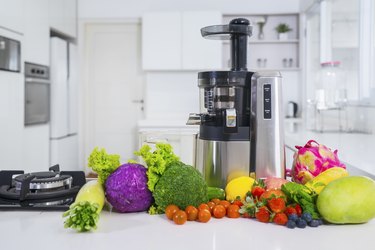
People juice for a number of different reasons — to increase their fruit and veggie intake, alleviate various ailments or to use as a detox. When it comes to weight gain and juice, you might not think of it as an option.
But juice is a concentrated source of calories, and can help you gain if it increases your overall caloric intake. However, juice is a concentrated source of sugar and has negligible protein, so it should not be your only means of helping you gain weight.
Video of the Day
Video of the Day
Read more: Weight Gain Meal Plan for Women
Consider the Calories
Gaining weight requires you to eat more calories than you expend. While weight-gain calorie needs vary from person to person, adding 500 calories to your daily intake should help you gain 1 pound a week, according to the University of Colorado. To gain weight healthfully, you want those extra calories to come from healthy foods.
Fruits and vegetables are nutrient dense, but not necessarily high in calories. However, juicing fruits and vegetables concentrates the calories, and creates a high-calorie drink that may help you in your weight-gain efforts.
The calories in a glass of juice varies, depending on the vegetable and fruit you're juicing. According to the USDA, an 8-ounce glass of carrot juice has 70 calories and 11 grams of sugar, while the same serving of apple juice has 110 calories and 22 grams of sugar per 8 ounces.
Beware of High-Calorie Juice
While you may want the calories from juice to help with your weight gain, you may not want all the sugar. Five hundred calories' worth of high-calorie juice may contain more than 70 grams of sugar, which is equivalent to consuming 17.5 teaspoons of table sugar, according to Michigan State University Extension.
Getting a heavy dose of sugar in a drink can cause a spike in your blood sugar, which may be concerning for people who need to control blood sugar such as those with diabetes.
Fresh juice is also not a good source of protein, fat, vitamin D, calcium or iron, and may not provide the balanced nutrition you need when it comes to healthy weight gain.
Using Juice for Weight Gain
You may be able to limit the effects of your juice on blood sugar by adding some of the pulp back for added fiber to help slow the rate of digestion so the sugar isn't absorbed as quickly.
You may also consider limiting your fresh juice intake to no more than 8 ounces a day and getting the rest of your weight-gain calories from other high-calorie, nutrient-rich foods such as nuts, seeds, eggs, cheese or vegetable oils.
For a more balanced approach, consider using your fresh juice in a smoothie. Blend 1 cup of soy milk with 1/2 cup of fresh orange juice, a medium banana, 1 cup of blueberries and 1 tablespoon of almond butter for a smoothie that has 412 calories and 41.4 grams of sugar.
Drinking a 500-calorie smoothie each day in addition to your regular dietary intake could help you gain 1 pound per week. For variety in your fruit juice smoothies, use different kinds of juices, fruits, nut butters, milks and Greek yogurt.
Read more: What Foods to Eat to Gain Weight Quickly?
Follow These Tips
To prevent foodborne illness with juicing, it's important to follow certain precautions before you start the extracting. First, you want to juice fresh produce that's free of mold and soft spots.
Also, before cutting or juicing, rinse your fruits and veggies under cold water to remove dirt and other contaminants, as advised by the Food and Drug Administration.
- Michigan State University Extension: "How to Convert Grams of Sugar Into Teaspoons"
- USDA FoodData Central: "Soy Milk"
- USDA FoodData Central: "Orange Juice"
- USDA FoodData Central: "Banana, Raw"
- USDA FoodData Central: "Blueberries"
- USDA FoodData Central: "Almond Butter"
- USDA FoodData Central: "Carrot Juice"
- USDA FoodData Central: "Apple Juice"
- University of Colorado: "Eating Strategies to Gain Weight"
- Food and Drug Administration: "Selecting and Serving Produce Safely"